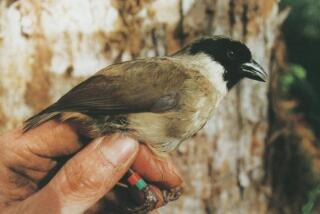Don’t Be Distracted by Alien Cows : Biodiversity: The U.S. has everything to gain in ratifying the global treaty for preserving species and ecosystems.
- Share via
The U.S. Senate will soon have a vital test before it--if, that is, it can muster the time and determination to deal with the most critical matters that face it in the upcoming lame-duck session. This test lacks the media drama of health reform or crime, but passing it or failing it will nevertheless have sweeping global significance.
The upcoming vote on whether to ratify the International Convention on Biological Diversity, a treaty that emerged from the Rio environment summit two years ago, will establish for the rest of the world whether the United States really cares about the conservation of species and ecosystems. We originally declined to sign; now we have done so, and the Senate must supply the required ratification vote.
There is no time to lose. The first conference of parties to the treaty is scheduled for November, and if we fail to ratify, we will not be at the table.
What does the convention actually accomplish? Its most significant sections commit signatory nations to monitor organisms and their habitats and to develop protection plans for those in danger.
A prospect that appeared potentially troublesome in the early going was the likely development, under the treaty, of a rigid and confining biological safety protocol--a regulatory regime for controlling the transfer of plants and animals and field-testing new varieties. There is indeed a worry here.
Biosafety regulations that differentiate by the use of a particular technique rather than by outcome (that is, treat similar genetic modifications differently depending on whether they are wrought by recombinant DNA methods or by “classical” methods) have been widely criticized on scientific and competitiveness grounds following their adoption in the European Union and in Japan. The treaty panel discussing the form and implementation of the safety protocol has already headed down the wrong track: A preliminary report suggests a protocol drawn along the European lines. That would be a mistake. But no signatory is obliged to accept a defective biosafety protocol, and the United States will have a better chance of moving the parties toward the kind of science-based regulation it favors if it is present as a party and not just an observer.
In reaching its decision, the Senate will have to navigate in a blizzard of misinformation. For example, one article of the convention is an admirable provision requiring each party, as far as possible, to prevent the introduction and control the spread of alien species that threaten ecosystems. It is plainly aimed at the kind of introductions--goats and pigs on Pacific islands, rabbits in Australia and the like--that have been a very important cause of the extinction of native species. Yet in a Washington Times editorial it was asserted that the provision referred to domesticated animals--alien cows!--and would mean “eliminating the U.S. livestock industry.” Nothing, of course, could be further from the truth: “Alien species” does not apply to domesticated animals.
The Senate Foreign Relations Committed, in formulating its unanimous recommendation for ratification last June, heard a lot of testimony. Much of it dwelt, understandably, on the potential economic gains to be realized from biological diversity. For many of us, though, the central concern is about a collection of values, both humanistic and scientific, now being lost in this greatest extinction episode in the planet’s history.
The tens of millions of undiscovered, undescribed species--in addition to the much smaller number we already know about--represent an irreplaceable resource; each is the unique end-point of a long evolutionary process that will never be duplicated. One may be the keystone of a complex ecosystem that plays some role in climate stabilization. Another may contain gene sequences that may yield new understanding about the control of behavior. Still another may, because of its beauty or its grandeur, have a special hold on the human imagination--as eagles have for some of us, or otters for others.
Failure to ratify this treaty would send a signal to the world that we do not care about these values, and that we are not prepared to join with the vast majority of nations in preserving them. That would be even more damaging than the lost opportunity itself.
More to Read
Sign up for Essential California
The most important California stories and recommendations in your inbox every morning.
You may occasionally receive promotional content from the Los Angeles Times.













